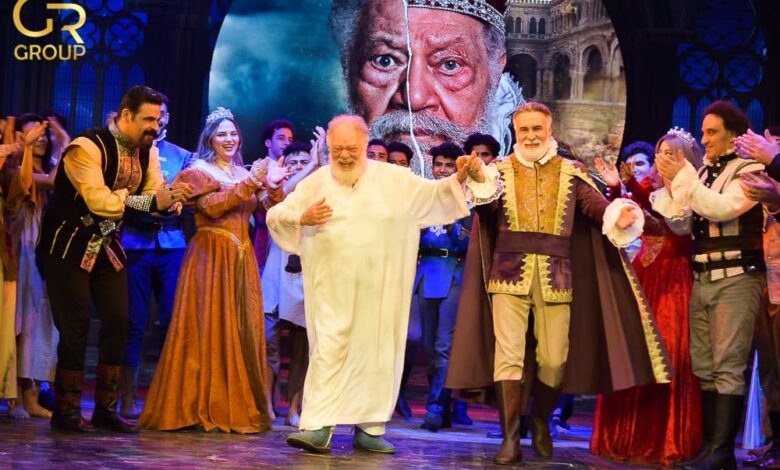
Who among us isn’t filled with a deep longing for “classical theater”?
For my part, I’ve always been one to reject categorizing and labeling it, believing that “theater is theater,” just as Aristotle described when he divided it into comedy and tragedy, with each part having its own rules, language, and acting tools.
Putting labels and divisions aside, we return to the article’s first words: “The longing for classical theater.”
This feeling led me, like an ardent admirer, to the iconic Egyptian National Theater (Al Masrah Al Qawmy Al Misry), which has restaged the play “King Lear” for the third time, starring the pioneer of Arab and Egyptian theater, the ever-creative actor Yehia Al-Fakharany.
As the clock’s hands approached nine pm, the chimes of the Egyptian National Theater rang, accompanied by the voice of Al-Fakharany. He addressed his audience, asking them to switch off their phones, much like a ship’s captain announcing the start of a journey.
With that command, he steered them away from our speedy modern era and into the timeless world of Shakespeare.
As the curtain swept aside, the silent, the anticipating crowd was transported with their captain into a masterpiece. For three hours, they were immersed in a visual and auditory spectacle of indescribable beauty. The performance was a testament to creative brilliance across all elements—from the acting and set design to the physical performances, costumes, and every other detail of the production.
It was a visual and auditory pleasure that words and pens are unable to fully capture, leaving only profound respect and admiration in its wake.
Although “King Lear” comes from the essence of the past, it brilliantly brought together the past, present, and future. When I saw so many young faces on stage—not just a few—standing alongside a theatrical giant like Yehia al-Fakharany, embodying Shakespeare’s words with a deep belief in King Lear’s every line, I felt a heartfelt thank you was in order.
I am grateful to everyone involved in the production of “King Lear,” for they have succeeded in making both the present and future generations fall in love with classical theater, and specifically, the works of Shakespeare.
A word of thanks and praise is due to Ayman al-Shiewy, the director of the Egyptian National Theater, for bringing “King Lear” back to the stage. I know this is a great risk in our age defined by noise and speed.
To present a classical play in this era was a personal gamble – and indeed, al-Shiewy won.
The proof of his victory was made evident by the crowds of diverse ages that flocked to the theater. My heartfelt thanks go to Ayman for sparing no effort in producing this beautiful and impressive artistic masterpiece for all theater enthusiasts.
As a devoted lover of theater myself, I thank you for preserving a truly integrated theatrical experience through “King Lear” in a time when it is so difficult to find.
Author’s biography
Nermin al-Houti is an associate professor of the Department of Criticism at the Higher Institute of Dramatic Arts in Kuwait.
She holds a PhD in Philosophy of Literary Criticism and is a graduate of the Higher Institute of Dramatic Arts.
Houti is a member of the Association of Writers and the Journalists Association, and is also part of the literary arbitration committees on theater or poetry in Kuwait and other Arab countries.
She has authored numerous newspapers and magazines articles and several books on significant theatrical works examining women’s issues, the latest of which is “The Women in Ismail Abdullah’s Theater”.
She has been chosen as a panelist in various significant cultural events and has participated in multiple seminars across the Arab region.




